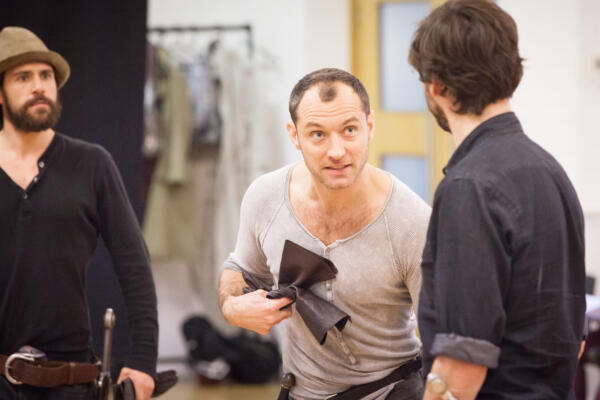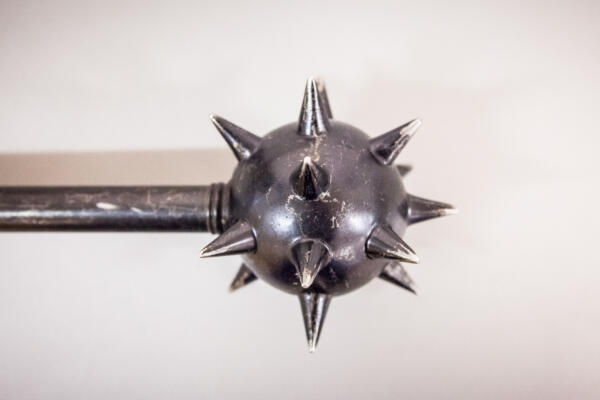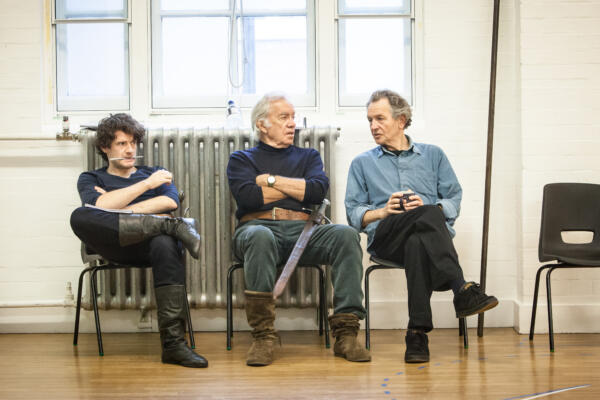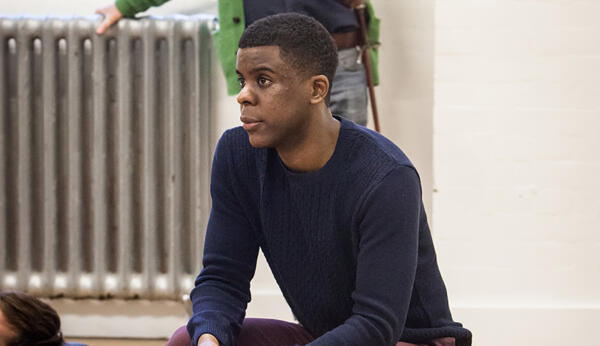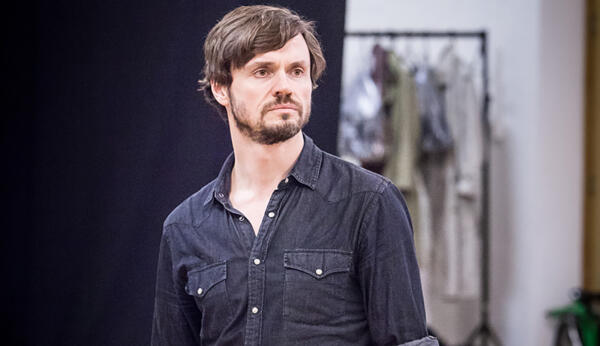Henry V | Inside the Rehearsal Room
Henry V– Week One, Day One
Education Associate Dominic Francis provides an insight into the cast and Creative Team’s rehearsal process for Henry V
Having assembled the cast and Creative Team of Henry V for the traditional ‘Meet and Greet’ on the first day of rehearsals, Artistic Director Michael Grandage offers a brief introduction to the play and production, commenting that it’s ‘rarely seen in the West End’. He highlights the fact that Henry V depicts a time nearly six hundred years ago and reflects on the need to make it relevant to contemporary audiences. Michael focuses on the Chorus, who in this production will double as the Boy. (The Boy is the Chorus and vice-versa.) He will be dressed in modern, twenty-first century clothing. ‘He will be our invisible chord between now and then. I want the “then” to be as relevant to the now as it can possibly be.’ Michael comments on the Chorus/Boy’s relationship with the audience: ‘It’s not many people in the play who have direct address.’
He refers to the 2003 production at the National Theatre, directed by Nicholas Hytner, observing that this was staged when the UK was at war in Iraq. ‘That was Nick Hytner speaking to an audience about then.’ Michael’s keen to ‘unlock the play on an even deeper level’, guarding against the pitfalls of attempting to draw too many parallels with the present day. ‘If you just do a modern-dress production you only ever see yourself on stage – you don’t see the past. We’re celebrating a part of British history that seems to be alive, viewing the “now” through the prism of “then”.’
This leads Jude Law, playing Henry, to ask about costumes – ‘Will it be in period dress?’ Michael tends to be cautious about anything that purports to historical accuracy. ‘There may be a whiff of “nonny”,’ he says with a smile – ‘nonny’ being his word to describe those elements associated with more traditional stagings of Shakespeare: ‘Tuckets and tights’.
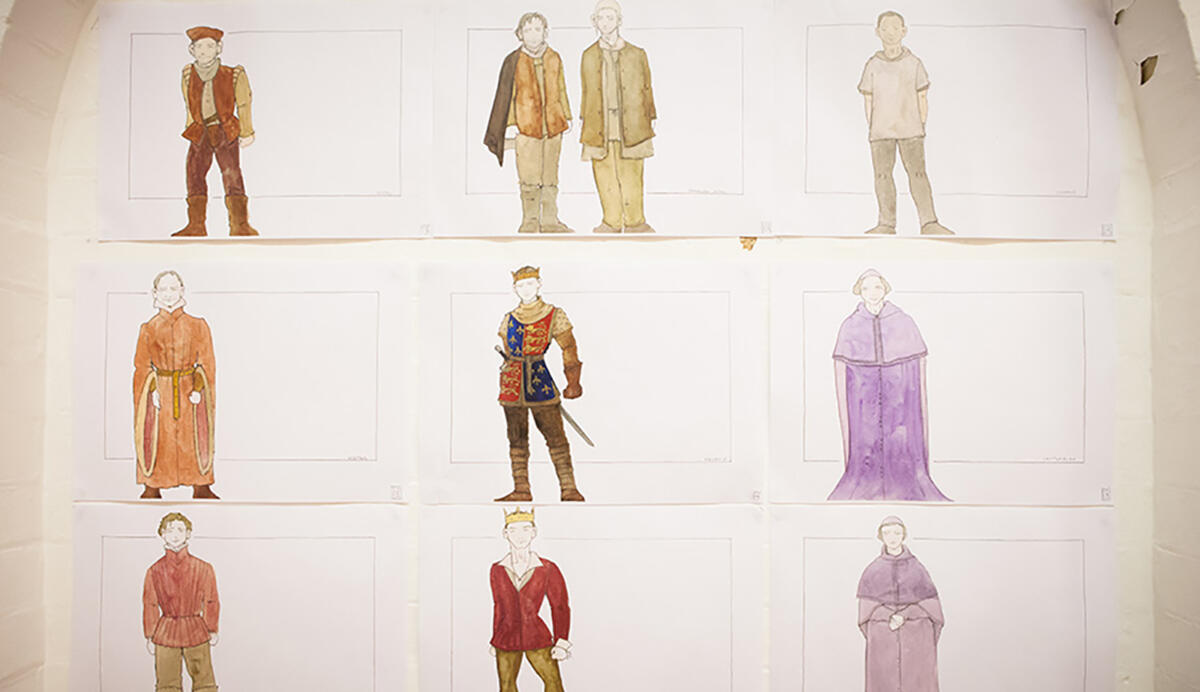
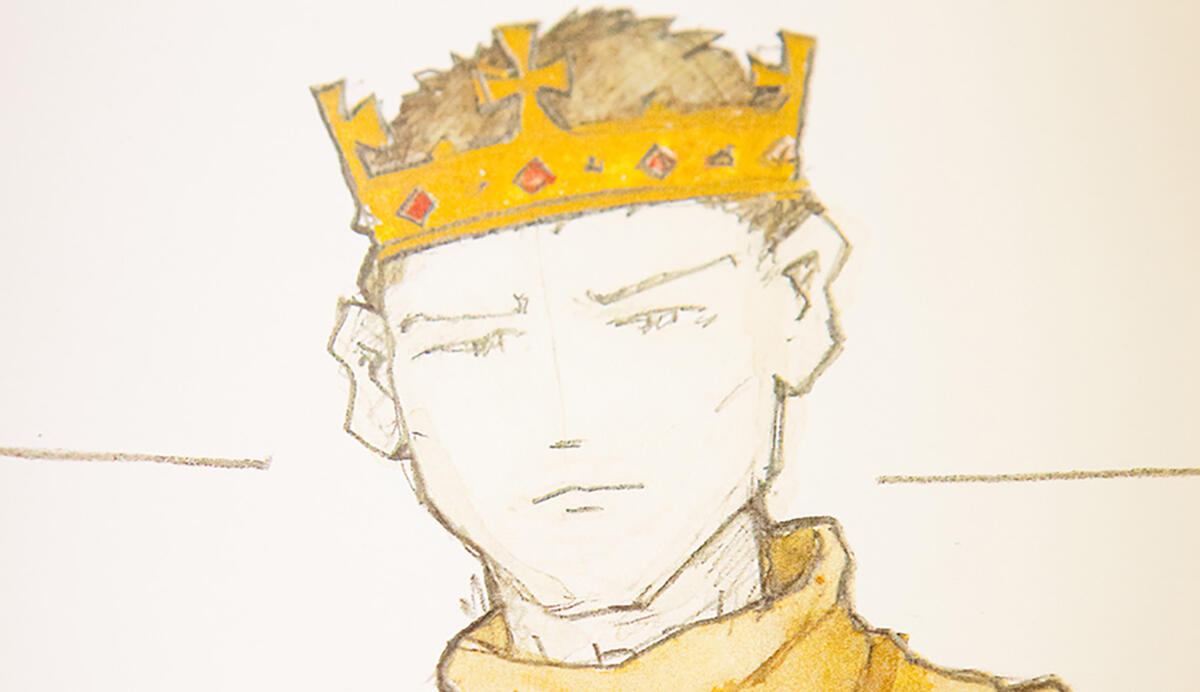
At this point Michael invites designer Christopher Oram to share his sketches, who discusses the ‘nature of the fabrics and colours’ – the English court will be in red with the French in blue. Christopher explains that most of the costumes will be hired from Angels, the costumiers, who have among the garments in their warehouse items used in Laurence Olivier’s 1944 film of the play. He prefers ‘costumes with history and life’, explaining that it’s ‘how you put them together’ – layering garments and crossing periods. ‘The space should look like it’s told a thousand stories,’ says Christopher.
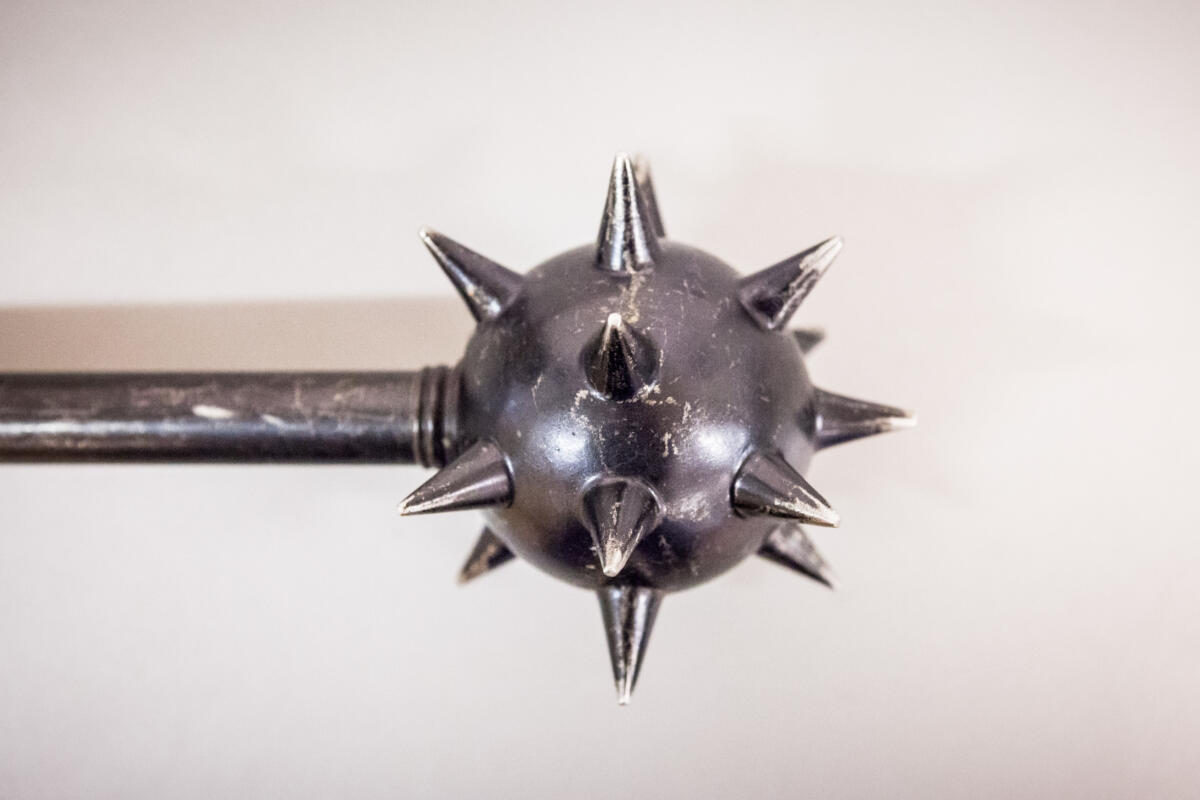
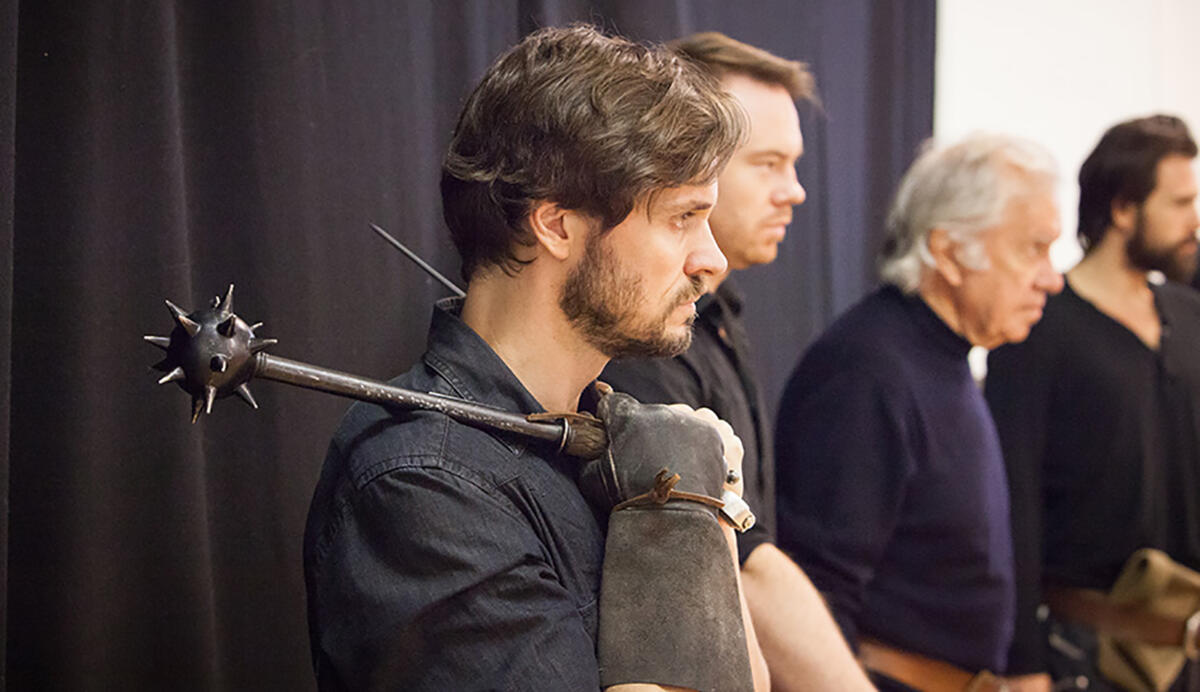
‘It’s quite a butch, masculine world,’ observes Michael. ‘The design is part of the earth. Rooted.’ He refers to axes and clubs instead of swords, the hierarchy within the army depicted by different weapons. He and Christopher discuss costumes in terms of characters with a ‘strong silhouette’, Michael reflecting on the terminology used – ‘I don’t see them as costumes but as clothes.’ The clergy have long robes to suggest their status, whereas the characters that inhabit Eastcheap – Pistol, Bardolph and Nym – have a ‘very different line’. Some actors play more than one character and the plan is to ‘wig the doubles’ in order to differentiate their parts. The guiding principle is to remove hair for subsequent appearances. ‘I’m not a fan of adding more on for the second character,’ says Michael. ‘I think audiences are cleverer than that – they look for disguises.’
Christopher explains that fittings will take place over the coming three weeks, so that the ‘clothes’ are ready for the rehearsal room. Michael elaborates on the production schedule: ‘Week five is focused on technical. Running but still rehearsing, still excavating character.’ He wants to introduce as many elements to the rehearsal room as possible in order to prepare the actors. ‘Lighting is the only thing that can’t join us ahead,’ he explains. All the departments are working towards the moment where the production meets an audience. ‘We have a duty to be ready by first preview,’ says Michael.
Although he only rehearses with those actors in a scene present in the room, Michael acknowledges the fact that they’re a large company who need to meet regularly – ‘To keep in touch with the arc of the play.’ Unless it’s a new play, or a new translation or adaptation of an old one, he doesn’t start rehearsals with a readthrough. ‘They’re not a level playing field,’ he says. ‘People are at different stages. I’ve seen a real loss of nerves with some great actors. There’s no need to put ourselves through it.’
Instead, the actors in each scene will read through it once, then re-read it translating the words into ‘modern’ English, decoding the meaning of words no longer in common usage, which often have completely different meanings to that which we’d expect. To assist in this process, Text Consultant Professor Russell Jackson will be present throughout the first week of rehearsals. An academic and practitioner specialising in Shakespeare, he will act as a guide to the text, referring to various editions of the play. Michael comments that some scholars are purists, but not Russell – his is a practical, theatre-based approach to Shakespeare.
This, essentially, is Michael’s initial process – from translation to standing the play on its feet, putting the ‘broad brush strokes’ in place. He describes it as ‘table work standing up’ and concedes – especially for those new to the process – ‘It will feel unnerving getting up without much discussion’. On the issue of character research, Michael is consistent: ‘Back-story never killed anyone.’ He’s equally prepared to dispense with it, though, when necessary. ‘If something doesn’t work, just get rid of it.’
Ultimately, Michael wants to empower the cast in order to release them, enabling them to fully explore the play: ‘You should try and do as much excavation outside of rehearsals as possible so you can come in and play.’ This requires some basic preparatory work by the cast. ‘Familiarise yourself with lines by the start of rehearsals so you can experiment,’ encourages Michael. ‘Let’s make rehearsals about playing, not learning lines.’ He concludes his comments on process by observing that ‘part of the way I work needs to include absorption time’.
Michael suggests a readthrough at a later stage, ‘once we know who we are’. As part of the cast’s continuing research he thinks ‘it would be good to read through Henry IV Parts One and Two together’. Reference is also made to Orson Welles’ 1966 film Chimes at Midnight and the later My Own Private Idaho, made by Gus Van Sant in 1991 – both versions of the story of Falstaff and the young Henry.
Michael then returns to the play itself and its author, dating Henry V around 1595: ‘Mid-career. Shakespeare wrote it the same year as Hamlet – a writer at the height of his confidence.’ He makes this last point with reference to the staging, in particular the simplicity of the Chorus’ opening speech: ‘We’ve got nothing. Just actors on a bare stage.’ Michael re-iterates that the Chorus is part of the twenty-first century – ‘our world’ – in an attempt to keep it relevant to us. ‘The Boy comes out of his own story to talk to us. He then gets slaughtered and comes back as the Chorus.’ He describes the final scene of the play as ‘truly charming’: ‘The Chorus comes on and tells us how Henry’s son messes it all up – “It was hell!” – blackout!’
Michael maintains a constant check on fundamentals. ‘It’s about a group of actors telling a story. We must never lose the clarity of the storytelling. Ask yourselves what’s your “uber-intention”?’ He often describes his role as being, ‘if nothing else, to represent the audience’.
The initial discussion over, rehearsals begin in earnest with a session on Scene One, or ‘The Prologue’. Michael first considers the practical details: ‘I’ve got to work out one big thing – an announcement about mobiles.’ This impacts upon the opening moments of the performance. The initial idea is that the audience is thrown into darkness, out of which the Chorus walks forward – ‘Lights up in motion’. This leads to a crucial question: Is the Chorus stepping in or out of the action? Is he the Chorus or the Boy? ‘I love the impact of not knowing where the hell we are when the Chorus comes on,’ says Michael.
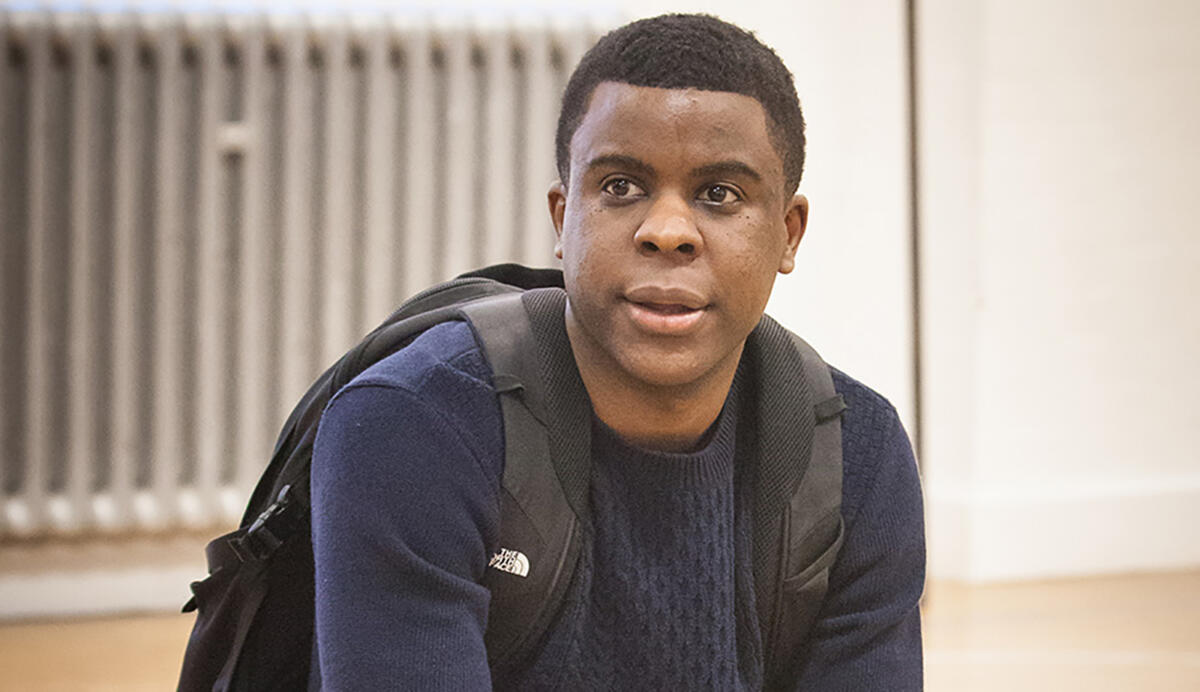
He wants a separate solo session with Ashley Zhangazha, playing the Chorus/Boy, to work through all his speeches. ‘You are my glue,’ Michael tells him. Considering his first appearance, he concludes: ‘There are two choices – you walk forward and take us all in, or the other is to come on talking… I can’t think that there’s a third choice.’ They explore the first one. ‘Use your walk to take us all in,’ he advises Ashley. ‘Come down and engage us.’
‘The energy of the speech is the hardest thing to crack,’ observes Michael. He comments on the ‘gear changes’ within it, ‘taking the relationship with the audience even further’. Russell agrees – ‘There’s a build in the scale.’ Michael encourages Ashley to find the rhythm of the speech, including the natural pauses: ‘Hold, hold, hold… Then move forward.’ He returns to the Chorus’ relationship with the audience, his need to ‘demand they sit forward… “This isn’t going to work unless you do the work”’. Michael reflects that the speech also works on the Chorus’ ‘imaginary senses’: ‘ “Think, when we talk of horses, that you see them / Printing their proud hoofs i‘ th’ receiving earth…” Imagine it!’
The other elements of production are already being considered, from discussions with Movement Director Michael Ashcroft, to sound. Michael doesn’t think there’s any music in the first scene. ‘Possibly the lightest of textures,’ suggests Composer & Sound Designer Adam Cork. The lighting is also key. Michael favours something arresting: ‘Click and the light’s on. It says, “Wake up!” Like a light at home, not a fade.’ He asks himself if the lights should come down at the end of the Prologue? Questioning how that connects with what comes next. Michael wants to avoid ‘severing the connection between the Prologue and the rest of the play’. He suggests the Chorus may linger on stage, checking on the progress of the performance.
Directors often feel a need to ‘illustrate’ the Prologue, comments Michael, and he wonders whether he needs to introduce the company? ‘A version where all the actors come on at the start.’ The set is made up of a series of doors, which can be opened and closed in various configurations, and for the first scene the upstage double-doors will be open to reveal an image of the king being dressed in ceremonial robes – ‘Henry putting on the first layer of his kingship.’
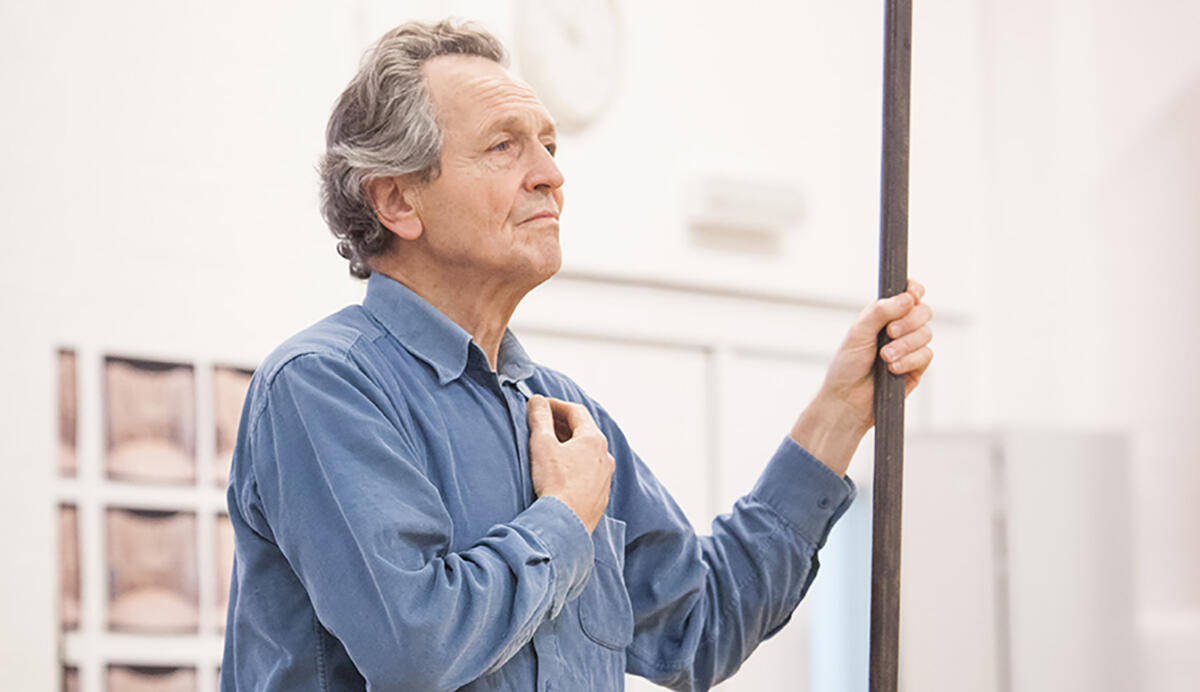
The first session on Scene One over, work on the next scene begins. Scene Two features the Archbishop of Canterbury, played by Michael Hadley, and the Bishop of Ely, played by Richard Clifford, discussing the king and his right to invade France. ‘Shakespeare starts the play with the clergy,’ observes Michael. ‘How do we get God into it?’ He wonders whether a sound is needed to indicate that we’re into the world of the play? Bells, for example.
Michael discusses the opening of the scene with the two actors: ‘We join you in mid-conversation? It’s not two people coming on from either side of the stage continuing a conversation from earlier? It’s not a scene at the Garrick Club, over port and cigars?’ He suggests one character needs to be imparting something to the other. ‘It’s not interesting, dramatically, to have two people knowing the same thing.’ Michael Hadley agrees: ‘It’s more urgent than that. Canterbury is giving the information to Ely for him to broadcast.’ It’s established that Canterbury is Ely’s boss – ‘Who’s got the biggest cathedral?’ joke the two actors – and that Ely is less spiritual than Canterbury, being more temporal instead.
Reflecting on the clergy’s exchange, Russell suggests that ‘it’s a political scene’. Michael focuses on one of Canterbury’s lines, in response to Ely’s assertion that the king is a ‘true lover’ of the Church – ‘But is he enough of a lover?’ ‘An active question. Where does he stand that we, politically, can use it?’ He encourages Richard to invest in Ely’s line more: ‘If you believe it, it helps us, the audience, on page four of the play.’
There’s a discussion about whether Scene Two is a prequel to Scene Three, which continues the debate above, the king literally walking in on Canterbury and Ely’s conversation. Throughout Scene Two there’s the tableau upstage of Henry preparing himself for kingship – ‘Still, like a painting’. This is the man to whom the clergy keep referring. ‘The carnal part of Henry has been replaced by spirituality,’ reflects Michael. This leads to the question: How did Henry become a good king?
The actors in Scene Three join the rehearsal. Having read through the scene and translated it, Michael observes that the play ‘starts in debate – the king’s right to a land’. He describes Henry’s opening monologue as the ‘key speech of the play’ – his ‘manifesto’ and justification for invading France. But the king remains concerned with the morality as well as the legality of his actions. ‘Who’s going to be responsible for the blood?’ asks Michael. ‘Who’s going to answer for the souls?’ And, most important of all: ‘Who’s going to answer to God?’ In this way, he suggests, Henry becomes the ‘moral centre’ of the play.
In terms of performance, Michael considers the relationship between the king and clergy: ‘How intimate are the initial discussions between Henry and Canterbury, plus the others, before the arrival of Montjoy?’ He acknowledges the complexity of the explanation given by Canterbury about the king’s right to invade France – ‘We need time to tune in and absorb it.’
There follows an hour’s break for lunch. When the cast return to continue work on Scene Three the discussion centres on the role of God within the play and, more importantly, Henry’s decision-making. ‘You’ve twice invoked God as the prime mover,’ Michael comments to Jude, adding that such references – ‘In the name of God’ – are not made lightly. ‘You bring God into every part of the play. He is the weight of the responsibility of going to war and losing lives.’
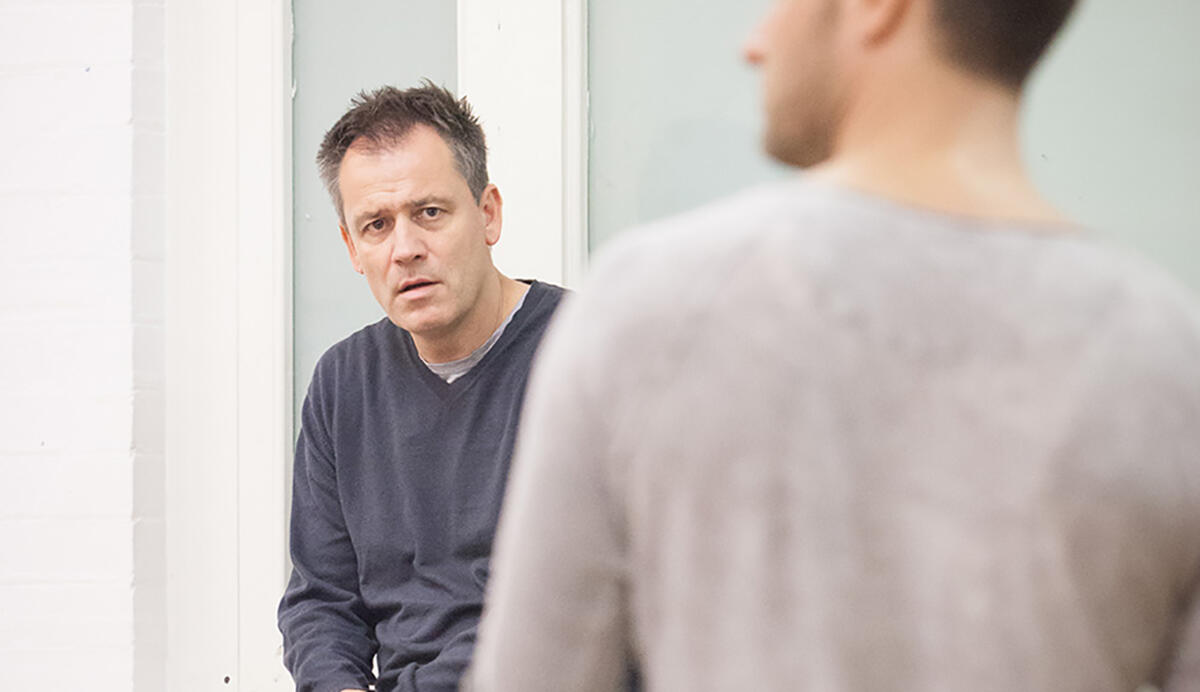
Jude thinks Henry’s overriding questions are: ‘Is it legal? And is it OK in the eyes of God?’ Michael describes him as a ‘young king constantly doubting his rightful place’. He draws a comparison between Henry and an actor: ‘Searching for the truth – the knowledge that he has a right to be on the throne.’ Jude agrees, commenting that ‘being the son of a usurper weighs heavily upon him’.
‘The scene is at odds with itself,’ observes Michael. ‘At its centre is a young man trying to uncover God’s role, while God’s men – Canterbury and Ely – are playing politics and urging war.’ Henry’s choice is a stark one, he suggests. ‘Either to fold France into your empire or just destroy it.’ The stakes are not lost on the young king, says Jude: ‘If I return without France then I don’t deserve to be King of England.’ To which Michael adds the corollary – ‘If I win France then I am God’s divinely appointed.’
They consider the Dauphin’s scornful attitude towards Henry, in particular his mocking presentation of a gift of tennis balls to the English king. But, suggests Michael, the French prince has misjudged the situation and, more importantly, the man. ‘The Dauphin has sent a message to the wrong Henry – he’s sent them to Hal.’ Michael particularly likes the king’s response to this insult: ‘A brilliant layering of something that really delivers. It builds and builds with real precision and focus’.
He comments on the overall tone of the scene. ‘It’s more of a council chamber meeting,’ ascribing this to the ‘adversarial nature of France and England on this first appearance, when they’re on separate sides of the stage’. There’s some discussion about whether the throne should be on or off during the scene, whether it should be a presence throughout? ‘The throne represents the job,’ says Jude, reflecting on its symbolic significance.
The session over there are some technical notes about the pronunciation of certain words – for example, Canterbury and Henry’s reference to ‘Salic law’. ‘Are we going to hear the “t” on Agincourt?’ Russell asks, suggesting that we should. Michael’s main concern regarding all pronunciation is that it’s consistent throughout.
Rehearsals continue with a brief session on Scene Four, a short scene of just eleven lines featuring the Chorus. ‘My only problem with the Chorus,’ says Michael, ‘is that sometimes it feels as though Shakespeare’s forgotten him.’ They consider keeping him on stage, watching the action, during scenes two and three – ‘Observing a fairly sedentary scene.’ It’s in this scene that the Chorus becomes the Boy. ‘For the first time ever,’ reflects Russell, ‘the Chorus is one of the “Youth of England”.’
Michael talks to Adam about incorporating some sound to underscore the latter part of the Chorus’ speech – Eastcheap coming to life. He tells Stage Management that he wants to call more actors the next time they rehearse this scene.
More members of the cast join rehearsals for Scene Five, the first set in Eastcheap, with Pistol, Bardolph, Nym and Mistress Quickly. Michael highlights the contrast between this scene and the preceding ones: ‘The first scenes are full of purpose. The writer has made us believe we’re all off to France, but there’s still this rather redundant society elsewhere in England.’
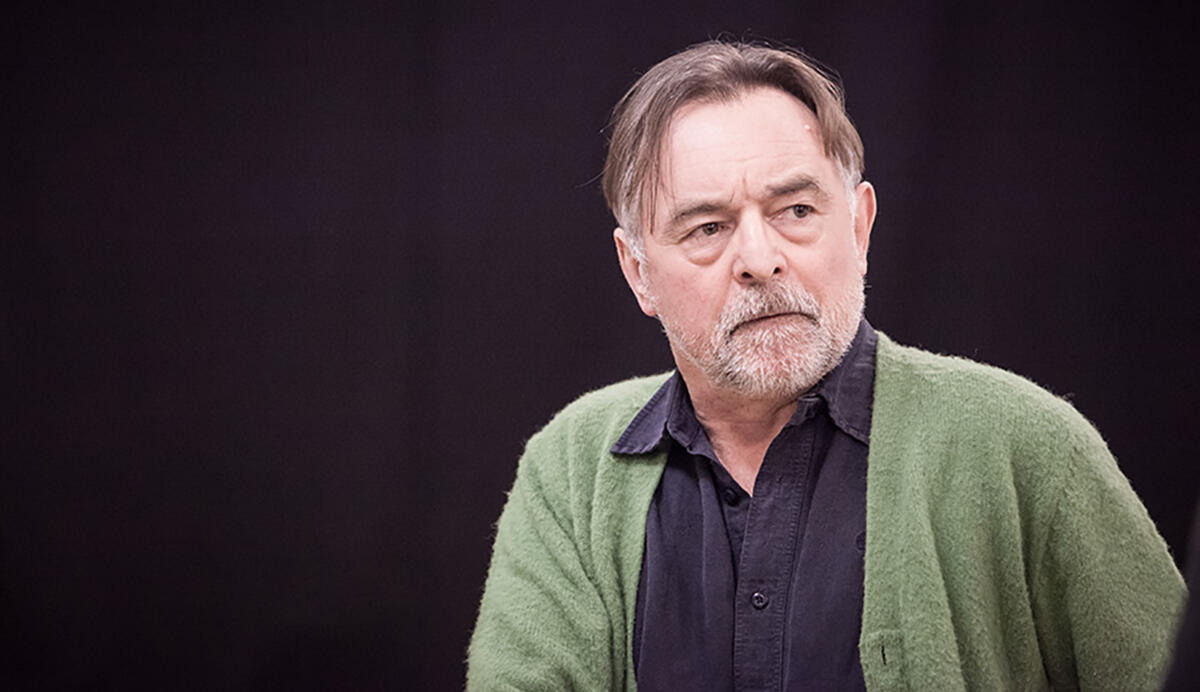
He questions who Bardolph and Nym, for example, are? ‘Do you live here? In this area?’ (It’s observed that ‘Nym’ means to steal.) Ron Cook, playing Pistol, is taking a reference to the petty thief as a ‘counterfeit rascal’ as inspiration for his interpretation of the character. ‘He’s someone who’s seen too many Christopher Marlowe plays!’ he quips. Referring to the impending war, Ron asks: ‘Are we expecting Falstaff to lead us to France?’ Here, suggests Michael, with the death of Falstaff, Shakespeare is bringing us back to one of the central characters of Henry IV Parts One and Two.
A key feature of this scene and the relationships between the characters is the underlying tension between Nym and Pistol – Pistol having just married Nym’s former lover, Mistress Quickly. ‘What would we gain if Pistol and Quickly were about to enter from the wedding itself?’ asks Michael. ‘Does it help? Does it colour it at all?’
In addition to discussing the play and characters, Michael maintains a focus on the practicalities of staging the scene: ‘Let that action be partly on the walk, to have you down on the diagonal when they enter.’ He considers every moment, including the ‘breath before a scene’ and comments ‘tonally’ on the developing performance, counseling actors not to ‘let it lose that edge’. At the end of the session, Michael reflects on the continuing exploration: ‘There’s a hundred and fifty questions I’ve got out of that, but I’m sure you’ve got more.’ In this way, discussions continue and new discoveries are made.
The day’s rehearsal ends with a session on Scene Six, another of the Chorus’ monologues. It’s noted that this speech has been cut in two. Michael asks Ashley to come on as the Boy, then turn to the audience as the Chorus. He describes this as ‘meshing in’ the two characters.
In terms of location, Michael sees no need to set the scene in an anonymous council chamber, but rather on the pier at Southampton where Henry and his men are about to embark. This leads to a technical consideration, Michael saying to Stage Management: ‘Note to Neil Austin [Lighting Designer] to open one of the doors and have a shaft of light come through.’ Adam also times the reading to calculate the length of any potential underscoring, commenting that he wants to ‘distinguish “Southampton” sonically’.
At the top of the speech, Michael encourages Ashley to ‘take the DNA of the previous scene into this one – there’s an underscoring of sadness about Falstaff dying’. He asks him to ‘colour the word “French”,’ which leads Ashley to ask Michael what the Chorus’ attitude towards France should be? They discuss this, with Michael keeping a check on anything ‘that could be construed as us being jingoistic’.
He continually encourages Ashley to engage the audience in the telling of the story: ‘You’re looking out for those internal signals where you say to the audience, “Are you getting this, ladies and gentlemen?”’
